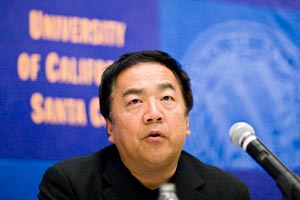John Kao is a fan of mashing things up to create "new smooshes."
"That's where real innovation comes from," said Kao, defining a "smoosh" as new collaborations or combinations. "New knowledge begins to emerge at the margins of traditional disciplines," he said.
Kao, who has been called an innovation guru, made his comments Saturday afternoon during a panel discussion "Innovation and Education in a Global Society" at the Humanities Lecture Hall, part of Alumni Reunion Weekend. (Missed the Intellectual Forum? Watch the video now.)
Mashing things up also means adopting a "beginner's mind," in Zen terms, he said. In an educational or corporate context it means pushing departments together and tearing down silos. It also means being prepared "to tolerate the inherent messiness."
Also speaking Saturday were author and commentator Victor Davis Hanson, a 1975 Cowell alumnus, and Shellye Archambeau, an expert in globalization for corporations. Moderating was Katy Roberts, a 1974 Kresge alumna, who has worked at the New York Times for 26 years and is now a senior editor at nytimes.com.
In kicking off the event, Chancellor George Blumenthal touted UC Santa Cruz's culture of innovation and interdisciplinary approach to research and teaching. The campus was innovative when it was founded and continues to be today, he said. "You might say innovation is in our DNA."
Blumenthal cited Bioinformatics, Digital Arts and New Media, and the STEPS Institute as examples of departments and programs that cut across traditional boundaries.
Hanson spoke passionately for classical liberal education, calling it "long-term inductive training." And he called for renewed respect for undergraduate teaching, receiving one of two spontaneous ovations from the audience of 200. A university needs research to inform undergraduate education but increasingly research universities "don't reward undergraduate education," he said.
(The other ovation came when he blasted the current administration's policy of promoting ethanol production.)
Hanson is a professor emeritus of classics at California State University, Fresno and a senior fellow at Stanford University's Hoover Institution. In 1991 he won an American Philological Association Excellence in Teaching Award, given yearly to the country's top undergraduate teachers of Greek and Latin. His daughter is a UC Santa Cruz undergraduate.
"Education is like water," Hanson said. "It doesn't change." A liberal education is needed to "translate the daily chaos into an abstract wisdom of the ages," he said.
Archambeau cited "ideas, people, and money" as the three things that fuel innovation. She also cautioned that global economic phenomena such as off-shoring, while disruptive in the short term, have the potential for long-term positive impact.
Roberts said she was pleased to find a global awareness at UC Santa Cruz, her alma mater. "I find this an extraordinary thing," she said. Roberts studied Russian at the University of Toronto in the 1970s and received her masters in Russian area studies and journalism at the University of Indiana.
Kao, who works with Finland and Singapore, among other governments, to help develop a culture of innovation, decried that little is being done in the U.S. on a national policy level.
"We know very little how to practice innovation on a systemic level," he said.
"Innovation is not just inventing new stuff to sell at a profit. It is supporting a set of big ideas," Kao said.
"We need a set of big ideas on what it means to be innovative in a global context," he continued. "We are in a pre-Copernican era in terms of innovation."
Contact the author at lasnier@ucsc.edu.



